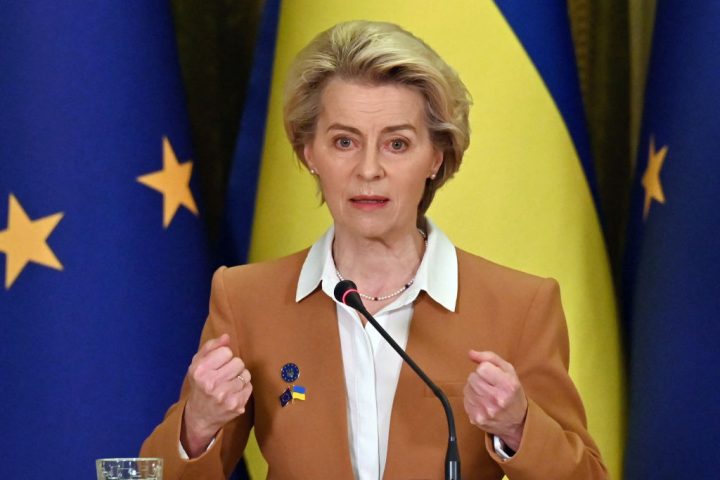This week, the European Union opted to extend sanctions on some 1,800 Russian companies and individuals for another six months, but it also lifted sanctions on three wealthy individuals. Alongside this, a recodification of the rights of member states which means that, in the name of preventing ‘exports’, individual Russian travellers’ cars, phones and even toiletries can be seized on entry. These decisions have raised a predictable storm.
The three lucky Russians whose sanctions were lifted are the billionaire Farkhad Akhmedov and businessmen Grigory Berezkin and Alexander Shulgin, all of whom had been put under restrictions for their links to the Kremlin. (A fourth man, Colonel Georgi Shuvaev, was also taken off the list, but as he had already died, this is likely of limited relief for him.)
The economic, social and political war between Russia and the West is sharpening
The EU does not give reasons for these decisions. But Shulgin, for example, who had previously been chief executive of Ozon – often described as ‘Russia’s Amazon’ – had just won a case at the European Court of Justice, which had found insufficient evidence that he remained an influential businessman when he stepped down.
It is a perverse thing that business figures who once traded on their relationship with the Kremlin are now desperately arguing how little of a connection they ever had. Let’s be clear, it was pretty much impossible to rise to the top in modern Russia without some kind of connection with the state, even if you weren’t one of Putin’s cronies or proxies.
Nonetheless, the EU’s choices have proven controversial, not least as they did not de-list Arkady Volozh, founder of the tech conglomerate Yandex. Volozh has not only left Russia and essentially broken with his company but also publicly condemned the war in a way few of his fellow emigre tycoons have.
Imprisoned opposition leader Alexei Navalny’s Anti-Corruption Foundation responded with incredulity. Maria Pevchikh, chair of its board, singled out Berezkin, saying on Twitter that he had been responsible for the muzzling of the media in Russia and was ‘making billions through energy companies in Russia’. She highlighted the allegations that Hungary had all but demanded – ‘blackmailed’, in Pevchikh’s words – that Berezkin was de-listed. After all, decisions must be unanimous, granting individual member states the opportunity to filibuster until they are bought off.
Particularly striking is that while three rich Russians have reason to celebrate, many others, a great deal of whom are opposed to the war and the regime, have new reasons to be worried. The EU issued a rewording of its rules allowing member states to clamp down on exports from Russia.
Rules explicitly intended to prevent schemes designed to ‘generate significant income for Russia’ can now be applied in a range of new and potentially petty ways. Cars had already been targeted, with the German authorities seizing a number which had Russian license plates, even if they were being driven by Russians who had emigrated. The rationale that these could be intended for sale to support the Russian government was already pretty untenable, but now Russians’ personal belongings, from mobile phones and laptops to toothpaste and suitcases, this seems even less credulous.
Considering that gold jewellery – which would surely be more suited to some covert income generation than half-used tubes of toothpaste – remains exempt, it is inevitable that Russians on both sides of the political divide are viewing this as spite. To be sure, these are essentially enabling rules, and it is up to individual member states if and how to apply them. Nonetheless, the prospect of someone who may now be living abroad, and even been a victim of Putin’s state, potentially having their phone confiscated when crossing an EU border has generated an inevitable outcry.
It may be that, beyond cars, relatively high value individual items whose Russian registration is very visible, these rules will never be applied. However, just as with the decisions over lifting personal sanctions, the very lack of clarity and transparency plays into the hands of Putin’s propagandists, who leap on every opportunity to present the West as hypocritically Russophobic, driven not by any moral vision but a visceral hatred of Russia and Russians.
It is also used to justify the Kremlin’s own vindictiveness. The freezing and seizure of Russian assets abroad, for example, has been used as an excuse for an increasingly expansive campaign of locking up those of companies trying to get out. Most recently, Danone and Carlsberg, both of which were close to arranging an exit from the Russian market, found themselves forcibly put under government-appointed administration. Indeed, Danone is now being temporarily run by Yakoub Zakriyev, the 32-year-old Chechen agriculture minister and, hardly incidentally, nephew of Chechen dictator Ramzan Kadyrov.
The economic, social and political war between Russia and the West is sharpening. The deep economic ties which used to connect both systems are being severed and weakened one by one; even human connections are fraying.
This may be inevitable, some might even say necessary. Yet what is also clear is a lack of vision and coherence in the West’s approach. When an oligarch who risks the Kremlin’s wrath by criticising the war remains sanctioned but others who keep their heads down are not, when a Russian who flees the country just to avoid being called up has the same chance of having his phone confiscated as one who protested against Putin, and while Russian crude oil is banned from European markets, but openly imported once it has been refined in India, it is legitimate to wonder: what exactly is the West’s strategy?







Comments